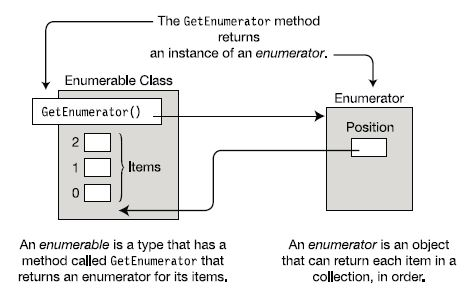Lang
Enumerables vs Enumerators
Enumerable
"Enumerable" defines an object that is meant to be iterated over, passing over each element once in order.
- arrays and objects are examples of enumerables
- an Enumerable is an object like an array, list, or any other sort of collection that implements the
IEnumerableinterface - Enumerables standardize looping over collections, and enables the use of useful extension methods like
List.Where()orList.Select().
IEnumerable is an interface that defines one method GetEnumerator which returns an IEnumerator interface, this in turn allows readonly access to a collection. A collection that implements IEnumerable can be used with a foreach statement.
Enumerator
"Enumerator" is an object that can return each item in a collection. Therefore, the enumerator knows the order of items and keeps track of where it is in sequence. It then returns the current item when it is requested.
IEnumerator provides two methods, MoveNext() and Reset(). It also has a property Current.
MoveNextis the method used to step over each item, applying any kind of custom iterator logic in the processCurrentis a method used to get the current item afterMoveNextis done. You end up with an interface that defines objects that can be enumerated, and how to handle that enumeration.
 in the above example:
in the above example:
- It gets the object’s enumerator by calling its GetEnumerator method.
- It requests each item from the enumerator and makes it available to your code as the iteration variable, which your code can read
every time you write a foreach loop, you’re using enumerators. You actually can’t use foreach on a collection that doesn’t implement IEnumerable. When it gets compiled, a foreach loop like this:
foreach (Int element in list)
{
// your code
}
Gets turned into a while loop, that processes until the Enumerable is out of items, calling MoveNext each time and setting the iterator variable to .Current.
IEnumerator enumerator= list.GetEnumerator();
while (list.MoveNext())
{
element = (Int)enumerator.Current
// your code
}
Coroutine
Coroutines are special functions that can pause execution and return back to the main thread.
- Coroutines return an enumerator
- therefore, Coroutines can use functions that have a return type of
IEnumerator
- therefore, Coroutines can use functions that have a return type of
- They’re commonly used for executing long actions that can take some time to finish, without causing the application to hang while waiting on the routine.
- For example, in games where the framerate of the application matters a lot, large hitches even on the order of a few milliseconds would hurt the user experience.
to break up execution over different frames, you’ll just need to yield return null whenever you’d like to pause execution and run more on the main thread.
- to use this Enumerator, you’ll need to call the function and assign it to a variable, which you can call
MoveNext()on at regular intervals.
in Unity
the Coroutine controller in Unity handles the processing of coroutines for us. All it's really doing is just calling MoveNext() once per frame, checking if it can process more, and handling the return value if it’s not null.